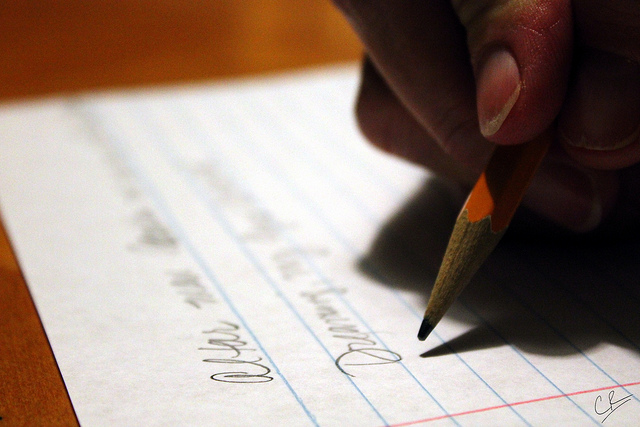Pseudonyms are nothing new to the literary world. Many of our beloved authors wrote under a nom de plume, for a variety of reasons. The Brontë sisters used more masculine names to avoid prejudice. Pseudonyms were often a form of protection or defiance, or as a storytelling device (see: Lemony Snicket or Horace Walpole). However, going by an alternative name is a practice that we still see repeated today. Names make a big difference; “ethnic” sounding names receive fewer opportunities in job applications, and are often a subject of ridicule.
So, when Michael Derrick Hudson submitted his poetry under the name Yi-Fen Chou as a “strategy” to get published at The Best American Poetry 2015, I was incredibly frustrated. How could a respected anthology endorse this man’s yellowface, defending their decision even after they discovered the deceit? How many of my friends and family have had to invent an “American” name for themselves because people refused to learn how to pronounce their Asian names? Even worse, he stole the name from an actual woman, a name given to her by her grandfather. My grandfather also named me, and I can’t imagine how insulted I would feel if someone stole it for their selfish use. There’s a lot to say about how offensive and entitled Hudson’s actions are, but I’d rather focus on the reactions. Ken Chen dissects the problem at NPR much better than I could:
In New York, where almost 70 percent of New Yorkers are people of color, all but 5 percent of writers reviewed in The New York Times are white. Hudson saw these crumbs and asked why they weren’t his. Rather than being a savvy opportunist, he’s another hysterical white man, envious of the few people of color who’ve breached their quarantine.
While I detest Hudson and what he did, the dialogue in Asian literature, especially Asian-American literature that emerged was honestly amazing and personally pushed me to a lot of self-reflection as an Asian-American studying primarily English literature. There aren’t a lot of moments where Asian-American writers have the spotlight, and while I haaaaate the reason for it, I love the people who spoke out. Jenny Yang’s They Pretend to Be Us While Pretending We Don’t Exist at Buzzfeed is a great read I highly recommend. Yang discusses her experience as a Chinese American in creative writing. She gives us the names of real poets of color and suggests we expand our horizons:
Be greedy and indulgent when you read the work of the poets of color in this year’s BAP like Saeed Jones, Claudia Rankine, Chen Chen, Rajiv Mohabir, Monica Youn, Aimee Nezhukumatathil, Jericho Brown, Natalie Diaz, Evie Shockley, and Airea D. Matthews. And beyond this book, beyond this moment, I encourage everyone to seek out the work of Asian American poets who weren’t included in the anthology but whose poetry we ought remember long after we forget this white guy in yellowname: Cathy Hong Park, Ken Chen, Tan Lin, Hoa Nguyen, Jason Koo, Jackie Wang, Wendy Xu, Trisha Low, Patrick Rosal, Brandon Shimoda, Bhanu Kapil, Wo Chan, Sally Mao, Ginger Ko, Muriel Leung, Jennifer Nelson, and Geraldine Kim. If that’s not enough, you can find more on Twitter under the hashtag #ActualAsianPoet.
I’m taking a course in Asian-American literature right now, and when my professor asked us what we’ve read in the genre most people said they haven’t read any Asian-American writing. They might’ve read Asian literature (mostly Murakami), but not Asian-American specifically. When you ask people if they know names in the genre, they might recognize The Joy Luck Club or stories of foot-binding and war (Or even worse, the offensive Memoirs of a Geisha). But there’s so much more out there!
The literature canon is changing, the first Cambridge Companion to Asian American Literature is out this year. I wish I had known about these stories when I was younger, and I hope they gain the recognition they deserve. What do you think, friends?
(via The Guardian, Image via Caleb Roenigk on Flickr)
—Please make note of The Mary Sue’s general comment policy.—
Do you follow The Mary Sue on Twitter, Facebook, Tumblr, Pinterest, & Google +?









Published: Sep 14, 2015 02:37 pm